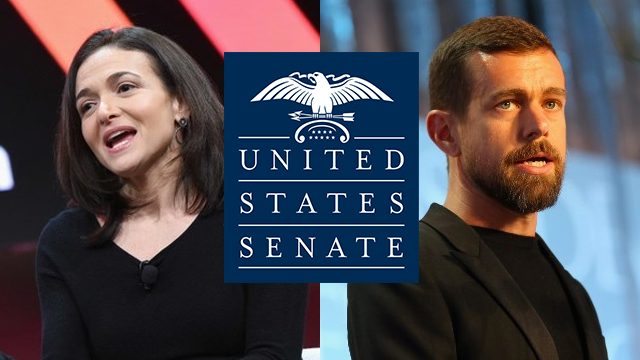SUMMARY
This is AI generated summarization, which may have errors. For context, always refer to the full article.

MANILA, Philippines – On Wednesday, September 5, top tech executives Sheryl Sandberg, the chief operating officer of Facebook, and Jack Dorsey, the CEO of Twitter, will appear before the US Senate intelligence committee in a hearing primarily about Russian meddling in the 2016 US elections.
They may also touch on issues such as data privacy, data harvesting, censorship, hate speech, bots and misinformation.
Google is also invited but has yet to confirm a representative, with lawmakers rejecting its offer of sending Kent Walker, its senior vice president of global affairs.
The hearing follows a series of congressional appearance for the tech giants, most notable of which were Mark Zuckerberg’s April 2018 appearance about the Cambridge Analytica data scandal and last year’s admission from the giants that Russia successfully gamed their platforms to influence US elections according to their own agendas.
It also represents the unreconciled – and growing – divide between Silicon Valley’s Big Tech and the US government.
Outcomes resulting from the hearings shape the online platforms used by the modern majority, and through which today’s content, information and news are created, published, and spread.
The changes affect all – the billions of users and the content they see and share; the tech giants and potentially how they run the business and how they generate profit; the US government and its power to regulate, which is something the giants have always naturally resisted; and governments worldwide as well, because information operation campaigns and social media manipulation are not merely US-endemic.
An Oxford study in July 2018 revealed that “cyber troops” have been used in 48 countries including the Philippines to manipulate opinion. This is up from 28 countries in 2017. (READ: Malacañang defends Duterte tapping Facebook for 2016 polls)
Why now?
The hearing comes at an important time in US politics with their midterm elections coming in November: the Congress is looking to take stock of what the platforms have done since last year’s revelation of the meddlings. How ready are the platforms for the upcoming polls? What changes have they implemented to minimize – at this time, complete neutralization may be a bit of a stretch yet – foreign influence on domestic affairs? How many are still potentially being influenced in spite of the changes? These are the questions.
In its most high-profile Big Tech session yet, the Zuckerberg hearing last April, the Facebook CEO came out relatively unscathed, answering with deft avoidance, and some charm and a showing of humility. Observers online thought that the lawmakers, if they were going to throw jabs, they could have at least thrown them harder.

That’s how soft or ineffective some people thought the lawmakers were, especially relative to the issue that was the Cambridge Analytica scandal, which saw the disgraced political consultancy obtain and use millions of user data to favor, allegedly, Donald Trump and his presidential bid.
The Philippines was also second only to the US in terms of numbers of users whose data may have been improperly shared by Cambridge Analytica in the lead-up to the Philippine elections.
Facebook avoided regulation then – from US lawmakers at least. The European Union’s (EU) implementation of the General Data Privacy Regulation (GDPR) in May gave firms – any firm that handles and collects user data – a tap on the shoulder, telling them to tell people how they’re data is being used, collected and stored, and whether they oblige to having their data being collected in the first place.
The GDPR, by the way, had a precursor: the Data Protection Directive, which dates all the way back to 1998.
The US, by comparison, has generally been more liberal, generally letting private companies self-regulate on such matters. But recently, arguments on whether the government now should interfere have grown beyond murmurs.
If online user data is not protected, and can continue to be used in meddling and information campaigns by foreign actors and partisans, the democratic process of voting may crumble. And that’s one of the core issues that the Sandberg-Dorsey hearing is seeking to address.
Continuing threats
The elections are up ahead, but right behind were another spate of incidents that show that the meddlers remain.
In July, Facebook removed 32 pages suspected of stoking hot-button issues likely of Russian origin. A month later, and just two weeks prior to the hearings, they removed another 650 pages identified as “networks of accounts misleading people about what they were doing” according to Mark Zuckerberg. More alarming was that the pages were linked not only to Russia, but to Iran state-owned entities as well, with behavior strategically similar to the Russian campaigns.
At around the same time, Google and Twitter made similar announcements, the former removing 58 on YouTube, Google Plus, and Blogger, and the latter, 284.
Microsoft, though not in the September 5 contingent, dealt with Russian cyber operatives too, announcing they shut down 6 fake internet domains mimicking US think tanks and the US Senate in order to gain user data such as log-in names and passwords.
Why do the attacks persist? Former Facebook security chief said not enough is being done to scare off the Russian offensive, which has only encouraged other countries like Iran to take a stab too.
“The revelations are evidence that Russia has not been deterred and that Iran is following in its footsteps. This underlines a sobering reality: America’s adversaries believe that it is still both safe and effective to attack US democracy using American technologies and the freedoms we cherish.”
If the alleged foreign actors can attack the US with impunity, little stops them from doing the same in other, less developed countries: foreign national interests dictating, in the shadows, the fate of other countries using the very same technology once meant to democratize.
Not just Russia
Like Zuckerberg’s testimony touching on issues beyond Cambridge Analytica, the upcoming “Foreign Influence Operations’ Use of Social Media Platforms” hearing will also likely touch on issues other than Russian meddling.
Here’s a guide to some of these issues and some of the recent related incidents:
- Trump’s accusations of Google search bias
US president Donald Trump in late August accused Google of being biased against conservatives. They’re only showing negative news in Google search results, the president claimed. Google replied, saying that their search engines don’t favor political leanings. An opposition represenative, Ted Lieu of California, chimed in, tweeting that there’s no conspiracy here, and the simple explanation is that when Trump behaves badly, most of the free press reports it.
- Google’s location tracking and Gmail privacy
Google has recently faced data privacy issues as well. In July, the Wall Street Journal reported that 3rd-party app makers may be getting access to your Gmail inbox if you’re not careful with your permissions. In response, Google promised that the app developers aren’t reading your email, and that they go through strict processes before they are given permission to your inbox.

A month later, Google was once again embroiled in a privacy issue, this time thanks to a report by the Associated Press, which details how you may be unwittingly allowing Google to track you because of a misleading location tracking setting.
Changes relating to this incident may have business implications for Google as their ad-driven business is more profitable the more data they have.
- The free speech argument
The US Constitution’s First Amendment guarantees no government control over what people are able to say.
Some say that Facebook being able to moderate and censor the content, even questionable ones, appearing on the site is a curtailment of free speech, and that they shouldn’t have the right to do so. However, as CNET explains, Facebook is a private company that is allowed to control the content on their platform; only the government is prevented from controlling speech.
The issue came into the spotlight recently when Apple, Facebook and YouTube simultaneously shut down the account of US conspiracy theorist Alex Jones because of hate speech. Twitter did the same later, suspending Jones’ account.
- The effectiveness of current political ad transparency features
Both Facebook and Twitter have made some steps to make sure people know who is behind a political ad, following government recommendations of an “Honest Ads Act,” which will require online political ads to be labeled and identified like ads on other forms of media.
These issues and more will be discussed in the hearing. Tune in to Rappler as we’ll be livestreaming it on September 5, 9:30 pm, PH time, followed by the House Energy And Commerce Committee’s “Twitter: Transparency and Accountability” hearing with Jack Dorsey on September 6, 1:30 am, PH time. – Rappler.com
Add a comment
How does this make you feel?
There are no comments yet. Add your comment to start the conversation.